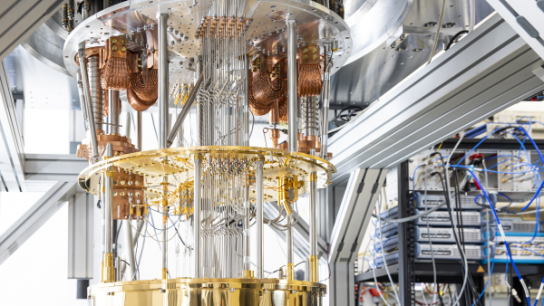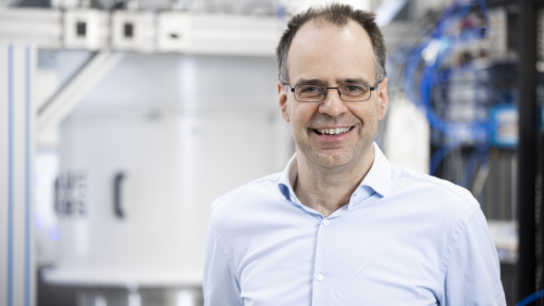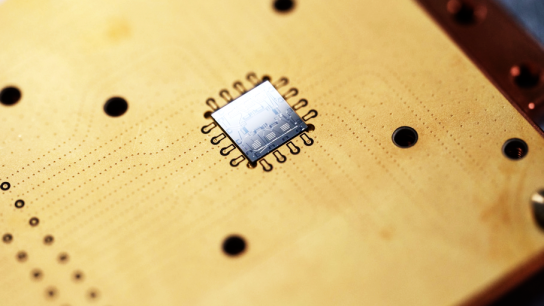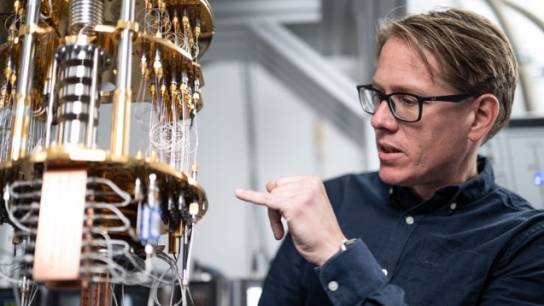First Back-to-Back Meeting of the Quantum Computer Projects QSolid and GeQCoS at KIT in March 2023
Quantum computers open up a completely new dimension in computer technology. They can be used to solve tasks that conventional computers fail at or take an unacceptably long time to process. Among other things, there is hope that they can be used to simulate the interactions of atoms and molecules in organisms and material structures, which could lead to groundbreaking successes in the development of medicines and new materials. So far, however, this has not yet been turned into reality. The development of a practically usable quantum computer is associated with enormous challenges, but in addition to solving the most difficult tasks, it also offers the opportunity to set industrial standards at an early stage and start a patent portfolio.
To accelerate development, the BMBF is funding a number of projects under its Quantum Technology Programme that deal with different technologies essential for building a quantum computer - both for quantum processors and for demonstration setups. These projects include GeQCoS (German Quantum Computer based on Superconducting Qubits) and QSolid (Quantum Computer in the Solid State).
QSolid Project Summary
The QSolid project is developing an integrated demonstration setup with qubits with the aim of achieving a particularly low error rate and a mixed architecture of quantum bits and microwave photons. After the end of the project, users will be able to test its performance for their applications on its customised firmware. QSolid is also developing technologies for rapid further scaling. In the first year of the project, the tracks were laid for the first prototypes.
GeQCoS Project Summary
The GeQCoS project is developing quantum processors with novel variants of superconducting qubits and coupling elements that could enable faster implementation of complex algorithms through reduced susceptibility to errors and a higher degree of interconnectivity. Novel parametric amplifiers and improved fabrication technologies will also increase the quality of quantum systems as well as improve their readout. These developed technologies will not only lead to new scientific insights, but also strengthen the entire quantum ecosystem in Germany and Europe through close links with companies.
Joint Meeting at KIT
The two projects are coordinated by the major quantum computing sites Jülich and Munich, but have many partners in common. They want to take advantage of the opportunity to exchange ideas at a meeting in Karlsruhe organised by their joint partner KIT. The focus here is on best practices in components, technical experience, new theoretical concepts, but also learning from each other in joint workshops. "The processor and demonstrator projects are different in their goals, but they live in a common ecosystem. Only if we remain in exchange throughout Germany we can wrest the ambitious goal of a scalable quantum computer from nature" says QSolid coordinator Frank Wilhelm-Mauch. GeQCoS coordinator Stefan Filipp says: "To overcome the technical challenges of building quantum computers, we need to join forces within Germany and also Europe. By holding joint meetings, we can make the most of the synergies of the two projects and also link them with the activities of the Munich Quantum Valley and the BMBF demonstrator project MUNIQC-SC."
QSolid Key Facts
Acronym: QSolid
Title: Quantum Computer in the Solid State
Duration: January 2022 - December 2026
Budget: € 76.3 m (of which 89.8 % is funded by the BMBF)
Coordination: Forschungszentrum Jülich GmbH, Prof. Dr Frank Wilhelm-Mauch
Partners: Forschungszentrum Jülich, Qruise, Fraunhofer IZM und IPMS, Karlsruhe Institute for Technology, Leibniz IPHT, ParityQC, HQS Quantum Simulations, Rosenberger, Ulm University, Physikalisch-Technische Bundesanstalt (PTB), Stuttgart Unversity, Free University of Berlin, IQM, Konstanz University, University of Cologne, Heinrich-Heine University Dusseldorf, supracon AG, ParTec, Racyics, AdMOS, LPKF Laser & Electronics AG, Atotech, Atos, Globalfoundries, CiS Forschungsinstitut für Mikrosensorik, Zurich Instruments
Website: www.q-solid.de
X (Formerly Twitter): twitter.com/QSolid_DE
LinkedIn: linkedin.com/showcase/qsolid
Contact:
Forschungszentrum Jülich
Tobias Schlößer
Press Officer
t.schloesser@fz-juelich.de
www.fz-juelich.de/en
GeQCoS Key Facts
Acronym: GeQCoS
Title: German Quantum Computer based on Superconducting Qubits
Duration: February 2021 - January 2025
Budget: € 18 m (of which 93.9% is funded by the BMBF)
Coordination: Walther-Meißner-Institut of the Bayerische Akademie der Wissenschaften, Prof. Dr Stefan Filipp
Partners: Walther-Meißner-Institut of the Bayerische Akademie der Wissenschaften, Fraunhofer-Institut für Angewandte Festkörperphysik, Infineon Technologies AG, Karlsruhe Institute for Technology IQMT und PHI, Friedrich-Alexander University of Erlangen Nuremberg, Forschungszentrum Jülich
Contact:
Walther-Meißner-Institut of the Bayerische Akademie der Wissenschaften
Stefan Filipp
Overall Coordinator
Stefan.Filipp@wmi.badw.de
www.wmi.badw.deBMBF Framework Programme: “Quantum Technologies – From Basic Research to Market”
The QSolid project is part of the framework programme entitled “Quantum technologies – from basic research to market”. Coordinated by the Federal Ministry of Education and Research (BMBF), the programme combines the goals of the German Federal Government in relation to the development of quantum technologies:
- Developing the quantum technology research landscape
- Creating research networks for new applications
- Establishing industrial competitiveness through lighthouse projects
- Ensuring security and technical sovereignty
- Shaping international collaboration
- Getting Germany’s population involved
The aim is to transfer quantum technology to industrial application. To accomplish this task, the Federal Government has provided the BMBF with over € 1 billion in funding. More information (in German): www.quantentechnologien.de/qt-in-deutschland/programm.html
Consolidating German Initiatives on Quantum Computers
As the nucleus of German activities in the field of quantum computing with superconducting qubits, the GeQCoS project represents the starting point for a concerted approach of the national initiatives. In addition to the close links to the demonstrator project QSolid, the participating partners also establish a strong link to Munich Quantum Valley, e.V., which is advancing the development of quantum computers based on several technologies with funding from the Free State of Bavaria amounting to € 300 million. In addition, a close connection to the MUNIQC-SC demonstrator project is ensured, which aims to build a scalable superconducting quantum computer with BMBF funding of € 44.2 million. The intensive exchange between the national research institutes will set the course for positioning Germany among the international leaders in the field of quantum technologies and quantum computing.
Download Press Release

Cryogenic setup and control of a superconducting quantum computer at Forschungszentrum Jülich © Forschungszentrum Jülich I Sascha Kreklau

QSolid project coordinator Prof. Frank Wilhelm-Mauch from Forschungszentrum Jülich © Forschungszentrum Jülich I Sascha Kreklau


